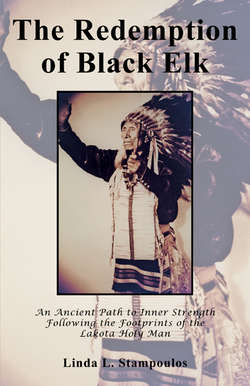Читать книгу The Redemption of Black Elk: An Ancient Path to Inner Strength Following the Footprints of the Lakota Holy Man - Linda L. Stampoulos - Страница 17
На сайте Литреса книга снята с продажи.
ОглавлениеMeditative Reading
The Tiospaye at the Little Bighorn The Final Days of the Sacred Hoop
Black Elk gives the account leading up to the Tiospaye gathering and the Battle with Custer’s 7th Calvary at the Little Bighorn.
We broke camp and went to join Crazy Horse’s band on the Tongue River. Then I went up into the Black Hills alone and had another vision under a tree and found out that the duty that was to come to me was that I would probably save the Black Hills. It looked as though it was impossible, but I was anxious to perform my duty on earth.
I was anxious to see my cousin Crazy Horse but he wasn’t there. He must have been on a warpath against the Crows.
Black Elk Tells About the Custer Battle
It was late in the Spring of 1876 when we went to join the others camped at the Little Bighorn. We took our horses out on the prairie beyond to graze them. We had about ten thousand ponies—so many you couldn’t count them. So many tipis we couldn’t count them also. We were guarding our horses. The women were out hunting turnips and the men were out hunting also. We had guards all around. The boys and the old men were taking a bath in the Little Bighorn River, which was flowing pretty full from the June rise. I was so young yet and I wasn’t very dependable, but in a case like this some of the boys asked me to go swimming.
I knew then that something terrible was going to happen within a day. I thought about the bow and arrows the spirits had given me. I thought lots of things in a short time there that couldn’t be imagined.
At daybreak my father woke me up and told me to go with him to take the horses out to graze. A cousin of mine and I were getting ready to take several horses out to graze. Then as I started, my father told me to be careful and I ought to have one horse with a long rope on it, easy to catch, and we should keep our eyes on the camp and look around us always. He said, “If anything happens bring horses back to camp right away as soon as you can.” We took the horses out and herded them as the sun was coming out. We stood out there until the sun came up higher. We just let the horses go and I tied a long rope to one of them and turned them all loose. We went back to the camp. It was getting warm now and so the people were all swimming in the river. Some men went out hunting and women were out digging turnips and it was about eight or nine o’clock. We had no breakfast and had to go back to get it. Everyone took his horses to water.
I did not feel right—I had a funny feeling all this time, because I thought that in an hour or so something terrible might happen. The boys were all swimming and I did not go down because I did not feel very good. I made up my mind I would go swimming anyway, so I greased up my body. At the Hunkpapas I heard the crier saying: “They are charging, the chargers are coming. Where the tipi is they say the chargers are coming. (The tipi where they had put their dead before when they came down to the Greasy Grass.) Then the crier at the Oglalas announced it and then each village announced it one after the other. We heard the cry going from village to village.
Just about this time my cousin had taken the horses to water and they were then just coming from the water. I had a buckskin mare and got her. Everyone was catching their horses at this time. We were lucky to get our horses—most of the people’s horses were out grazing yet they were running after them.
My brother came up and took hold of his horse and told me to go on back, but I had a six-shooter with me, which my sister had given me; and I had given my brother his gun. There were woods on the other side of the Hunkpapas. All the men got together and gathered in front of the woods. My brother hit for the bush. He told me to turn back, but I took after him. When I got to the timber the soldiers were shooting above us and you could see the leaves falling down off the trees where the bullets struck. I went in there and after that I did not know what happened back of me. We got under the brush little by little and we crossed the flat and the soldiers began to shoot at us and all we heard was: “Take courage, don’t be like a woman.” Some of them said, “Take courage, the helpless are out of their breath.”
The women were running to the hills. Little bunches at a time began to cross the flat. I was underneath in the brush and I did not quite notice what happened above me. I stood there under the trees and recalled my vision there again and it made me feel stronger. Then I thought that my people in my vision had been Thunder-beings, but I didn’t see why the soldiers should be doing this. I thought then that perhaps the people had used some of my power because I knew that we were going to wipe out the soldiers.
